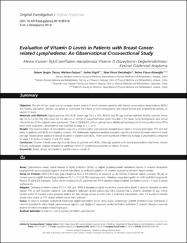| dc.contributor.author | Sezgin Özcan, Didem | |
| dc.contributor.author | Dalyan, Meltem | |
| dc.contributor.author | Ergül, Serhat | |
| dc.contributor.author | Ünsal Delialioğlu, Sibel | |
| dc.contributor.author | Köseoğlu, Belma Füsun | |
| dc.date.accessioned | 2019-12-31T11:29:27Z | |
| dc.date.available | 2019-12-31T11:29:27Z | |
| dc.date.issued | 2019 | en_US |
| dc.identifier.citation | Sezgin Özcan, D., Dalyan, M., Ergül, S., Ünsal Delialioğlu, S. ve Köseoğlu, B. F. (2019). Evaluation of vitamin D levels in patients with breast cancer-related lymphedema: An observational cross-sectional study. Turkish Journal of Osteoporosis, 25(3), 105-110. https://doi.org/10.4274/tod.galenos.2019.35119 | en_US |
| dc.identifier.issn | 2147-2653 | |
| dc.identifier.uri | https://doi.org/10.4274/tod.galenos.2019.35119 | |
| dc.identifier.uri | https://hdl.handle.net/20.500.12511/4838 | |
| dc.description.abstract | Objective: The aim of our study was to compare plasma vitamin D levels between patients with breast cancer-related lymphedema (BCRL) and healthy population, and also to investigate the effects of socio-demographic and clinical factors and lymphedema severity on vitamin D levels. Materials and Methods: Eighty patients with BCRL [mean age 55.5 +/- 8.9 (36-81)] and age- and sex-matched 80 healthy controls [mean age 53.7 +/- 7.4 (32-70)] who were not on calcium or vitamin D supplementation were included in the study. Socio-demographic and clinical characteristics of the subjects were questioned. Plasma 25-Hydroxyvitamin D3, calcium, phosphorus, alkaline phosphatase (ALP), and parathormone (PTH) levels were evaluated. Lymphedema was classified as stage 0, I, II, or III. Results: The mean duration of lymphedema was 23.5 +/- 13.8 months. Comparisons revealed lower vitamin D levels and higher PTH and ALP levels in patients with BCRL than healthy controls. As a result of multivariate regression analysis, a significant relationship was revealed between vitamin D levels and age, breast cancer stage, and disease duration in patients with BCRL. Vitamin D levels were significantly lower and PTH levels were significantly higher in stage 3 lymphedema patients compared to stage 1. Conclusion: Vitamin D levels were detected lower in patients with lymphedema than healthy controls. Although vitamin D levels were found to be lower in patients with severe lymphedema, the multivariate regression analysis revealed that the severity of lymphedema does not have a significant effect on vitamin D levels. | en_US |
| dc.language.iso | eng | en_US |
| dc.publisher | Galenos Yayıncılık | en_US |
| dc.rights | info:eu-repo/semantics/openAccess | en_US |
| dc.rights | Attribution NonCommercial 4.0 International | * |
| dc.rights.uri | https://creativecommons.org/licenses/by-nc/4.0/ | * |
| dc.subject | Vitamin D | en_US |
| dc.subject | Breast Cancer | en_US |
| dc.subject | Lymphedema | en_US |
| dc.subject | Parathormone | en_US |
| dc.title | Evaluation of vitamin D levels in patients with breast cancer-related lymphedema: An observational cross-sectional study | en_US |
| dc.type | article | en_US |
| dc.relation.ispartof | Turkish Journal of Osteoporosis | en_US |
| dc.department | İstanbul Medipol Üniversitesi, Sağlık Bilimleri Fakültesi, Fizyoterapi ve Rehabilitasyon Bölümü | en_US |
| dc.authorid | 0000-0003-0246-3001 | en_US |
| dc.identifier.volume | 25 | en_US |
| dc.identifier.issue | 3 | en_US |
| dc.identifier.startpage | 105 | en_US |
| dc.identifier.endpage | 110 | en_US |
| dc.relation.publicationcategory | Makale - Uluslararası Hakemli Dergi - Kurum Öğretim Elemanı | en_US |
| dc.identifier.doi | 10.4274/tod.galenos.2019.35119 | en_US |
| dc.identifier.scopusquality | Q4 | en_US |



















